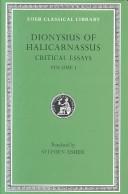| Listing 1 - 2 of 2 |
Sort by
|

ISBN: 0674995139 0434994669 0674995120 0434994650 9780434994663 9780434994656 9780674995130 9780674995123 Year: 1985 Volume: 466 Publisher: Cambridge (MA) : London : Harvard University Press, William Heinemann,
Abstract | Keywords | Export | Availability | Bookmark
 Loading...
Loading...Choose an application
- Reference Manager
- EndNote
- RefWorks (Direct export to RefWorks)
DIONYSIUS OF HALICARNASSUS migrated to Rome in 300 B.C., where he lived until his death some time after 8 B.C., writing his Roman Antiquities in twenty books and teaching the art of rhetoric and literary composition to a small group of upper-class Romans. His purpose, both in his own work and in his teaching, was to re-establish the classical Attic standards of purity, invention and taste in order to reassert the primacy of Greek as the literary language of the Mediterranean world. The essays in the present volume display the full range of Dionysius' critical expertise. In the treatise On Literary Composition, his finest and most original work, discussion of the effects produced by the arrangement of words involves minute analysis of phonetics and metre in addition to more general aspects of literary aesthetics such as the difference between poetry and prose, and the tripartite classification of the types of arrangement. The other four essays are on a less ambitious scale. The Dinarchus is primarily a study of authenticity in which Dionysius attempts to identify the genuine speeches of the latest Attic orator from the list of those ascribed to him by the librarians. The three literary letters are all concerned with possible models. In the Letter to Pompeius, Dionysius gives his reasons for criticizing Plato on stylistic and also moral grounds, and appends critiques of Herodotus, whom he greatly admired, and three other historians -- Xenophon, Philistus and Theopompus. Of the two Letters to Ammaeus, the second may be read as an appendix to the Thucydides, but the first concerns literary history, and investigates the question of whether Demosthenes could have learnt his oratorical skills from Aristotle's Rhetoric. Volume I contains the essays On the Ancient Orators, Lysias, Isocrates, Isaeus, Demosthenes, and Thucydides.
Classical Greek literature --- Literary rhetorics --- Dionysios d'halicarnasse --- Discours, essais, conferences --- Edition critique --- Greek prose literature.

ISBN: 3598713185 Year: 1999 Publisher: Stuttgart ; Leipzig B. G. Teubner
Abstract | Keywords | Export | Availability | Bookmark
 Loading...
Loading...Choose an application
- Reference Manager
- EndNote
- RefWorks (Direct export to RefWorks)
| Listing 1 - 2 of 2 |
Sort by
|

 Search
Search Feedback
Feedback About
About Help
Help News
News